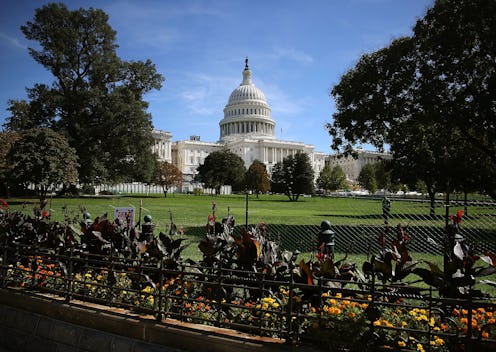News
The GOP And Keeping The Senate
The Republicans are in trouble. Their nominee, Donald Trump, is not just losing the race for the presidency, but according to some polls, losing by double digits. And as the leader of his party, Trump's likely loss could have big effects on other Republicans running for office as well. There are 34 Senate races at play in 2016 in addition to the presidential race. And with Republicans currently holding a lead of just four seats in the upper chamber of Congress, Democrats are trying their hardest to make sure that more than four seats flip from red to blue and give New York Senator Chuck Schumer control over the majority.
It seems likely, but still far from certain that the Democrats will succeed. There are several reliably Democratic states that have Republican senators that came into office due to the Republican wave in the 2010 midterm elections. Two of these — Ron Johnson of Wisconsin and Mark Kirk of Illinois — seem all but certain to fall to strong Democratic candidates — former Senator Russ Feingold and Representative (and Purple Heart recipient) Tammy Duckworth, respectively.
There are also some red states where the Democrats have fielded powerful candidates to make things competitive. Democratic former governor and Senator Evan Bayh is trying to get his seat in Indiana back — he was extremely popular in the state when he left, though he's been damaged by attacks that he's gone too Washington after spending the time since he left working as a lobbyist. And Jason Kander, a young Afghanistan vet and former elected official from Missouri, shot to national attention and competitive polling after this strikingly impressive (and frankly a little terrifying) campaign ad:
The Republicans have their own fair share of blue state senators who look strong despite coming from states that will likely go for Clinton. Rob Portman of Ohio has run away with his reelection race, largely due to a weak campaign from former Democratic Governor Ted Strickland, and Marco Rubio looks like he'll be able to stay in the Senate despite having previously said he hates it. Pat Toomey, despite running for reelection in Pennsylvania, which hasn't voted for a Democratic president since 1988, is holding his own against Kate McGinty in what has become the most expensive Senate race of all time.
The biggest difficulty for blue state Republicans like Toomey is the unpopularity of their party's presidential nominee in their states. This is especially difficult because Republican senators need Republican voters, including those who love Trump, to support them, so neither embracing nor denouncing Trump is good electoral strategy. This is perhaps clearest for Kelly Ayotte, the Republican incumbent in New Hampshire, who has had a difficult time threading the needle of whether she stands with or against Trump.
In many races, the focus of senate campaigns has little to do with specifics issues affecting the state, and more to do with Donald Trump. For a while, Joe Heck of Nevada seemed like the Republicans' only hope of picking up a new seat with minority leader Harry Reid retiring. But that was before Trump's Access Hollywood tape, and Heck's opponent started running ads deliberately tying him to Trump.
With under two weeks left in the election, it's this message that could decide everything. Can Republicans prove they aren't like Trump and do better than him in their states? And if they can, is that enough to win?
